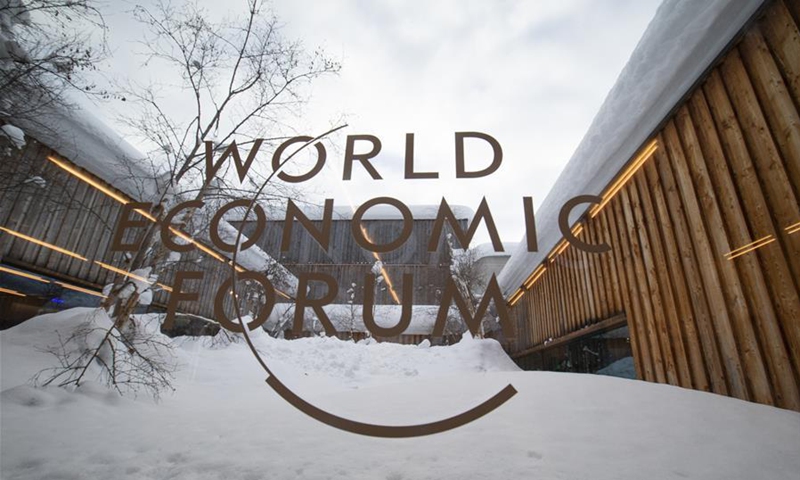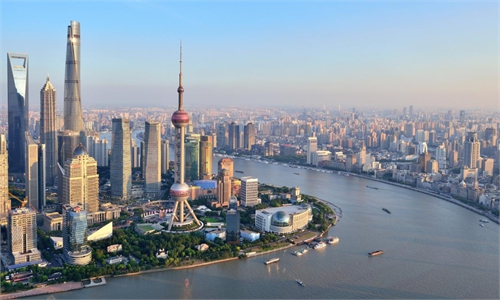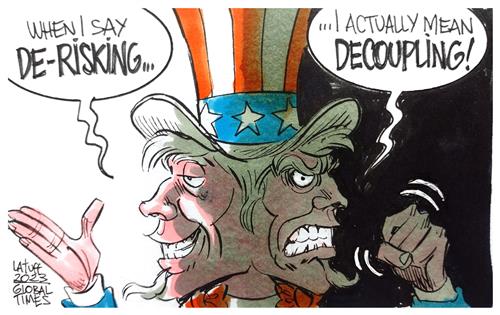
Photo taken on Jan. 21, 2019 shows the logo of the World Economic Forum (WEF) in Davos, Switzerland. The WEF Annual Meeting will kick off in Davos on Tuesday. (Xinhua/Xu Jinquan)
China will highlight its vision of an open world economy and win-win cooperation at the World Economic Forum (WEF) annual meeting and send a resounding signal that it will continue to open up its market for the world, which will stand in sharp contrast to the focus of some Western officials on geopolitical rivalry that has plagued the world economy, businesses and experts said on Sunday.
Chinese Premier Li Qiang will attend the WEF annual meeting and is scheduled to deliver a special address on Tuesday morning local time. Li's attendance underscores great importance China attaches to the WEF and multilateral cooperation as well as its commitment for openness and multilateralism, experts said.
China's unwavering commitment to opening-up and the steady recovery of its economy have become a highlight for the world economy, which is facing serious risks and challenges, including rising trade protectionism and geopolitical tension, global businesses and experts said. China remains the locomotive for global economic development, they noted.
Asked about China's hopes for the WEF annual meeting, Mao Ning, a spokesperson for the Chinese Foreign Ministry, said on Thursday that "in a world fraught with uncertainties and a struggle to find drivers for growth, we look to increase exchanges and communication and enhance mutual understanding and trust with other parties to the forum to contribute our part to better global economic recovery and governance and joint response to challenges."
In addition to attending the WEF annual meeting, Li will also pay official visits to Switzerland and Ireland, according to the Chinese Foreign Ministry, marking the first high-level major diplomatic event for the Chinese Premier in 2024. The trip will kick off high-level exchanges between China and Europe this year, the ministry said.
Li's attendance at the WEF annual meeting has in particular drawn widespread attention, as the world economy remains in a serious downturn and risks and challenges such as the rise of trade fragmentation. Many also have great expectation for China's economic recovery to drive global growth.
"By having such a high-level representation at the WEF, China shows great importance it attaches to the meeting, and also coveys to the world China's firm determination to continue to support the establishment of an open world economy and maintain the healthy development of economic globalization," Sang Baichuan, dean of the Institute of International Economy at the University of International Business and Economics, told the Global Times on Sunday.
Sang said China will promote multilateralism and strengthen communication at this forum to bridge differences, especially amid world economic uncertainty and relatively weak economic recovery after the epidemic.
That is also in line with the WEF annual meeting's theme of "rebuilding trust." Rising mistrust has become a serious problem for the global economy, as many major economies, the US in particular, have taken an increasingly protectionist approach. Washington is also focusing on geopolitical rivalry and constantly overstretching the concept of national security, instead of global cooperation. Such a focus is also likely to be on display, as Washington is sending Jake Sullivan, US national security adviser, according to the published schedule.
"In comparison, the US is expected to still verbally support globalization and talk about strengthening cooperation, but in practice, it will continue to decouple from and suppress countries that it believes pose institutional competition and have strategic differences," Sang said.
Open for business
While many Western officials are expected to focus on conflicts such as the Russia-Ukraine conflict and the war in the Gaza strip, Chinese officials will focus on economic development and cooperation, experts said.
"We believe Premier Li will further emphasize the fact that China is open for business and will continue along the path of market reforms and liberalization. In other words, we see China responding tactically to trade war dynamics, with precision strikes, but we don't see China moving away from its fundamental strategy of opening up its economies to foreign partners," Rani Jarkas, chairman of Cedrus Group, told the Global Times.
China has repeatedly vowed to further open up its market for global businesses. The Central Economic Work Conference in December 2023, which set economic priorities for 2024, pledged efforts to stabilize foreign trade and investment. Specifically, it said that market access for telecommunications, medical and other service industries shall be eased.
"Faced with the backdrop of rising global protectionism and competition between China and the US, China will further send signals that it would continue to expand opening-up," Sun Yanhong, a senior research fellow at the Institute of European Studies, Chinese Academy of Social Sciences, told the Global Times on Sunday, noting that it's likely that China will announce some opening-up measures at the WEF annual meeting.
China's continued opening-up and its steady economic recovery are injecting desperately needed impetus to the global economy, according to businesses and experts.
"With solid import growth, China has started to act again as the locomotive for the global economy, despite that internal demand growth is still below pre-COVID levels. We expect this recovery trend to continue in 2024, with stronger growth in internal demand and imports," said Jarkas.
Jarkas further noted that the recent drop in China's foreign direct investment as a sign that Western firms are repatriating profits due to liquidity issues in their home markets, and not because China is losing its attraction as an investment destination. "We believe FDI will increase rapidly once the monetary policy in the West becomes looser."
Saadia Zahidi, managing director of the WEF, told Xinhua last week that "China is one of the key economies in the world, and so the health of that economy then has very positive spillovers for the rest of the world."
China is scheduled to release economic data on Wednesday, which is widely expected to show that China's economic growth meet or even exceeds the official growth target of around 5 percent in 2023. China's economic recovery is expected to further consolidate in 2024, with some economists projecting an above 5 percent growth for the year.




